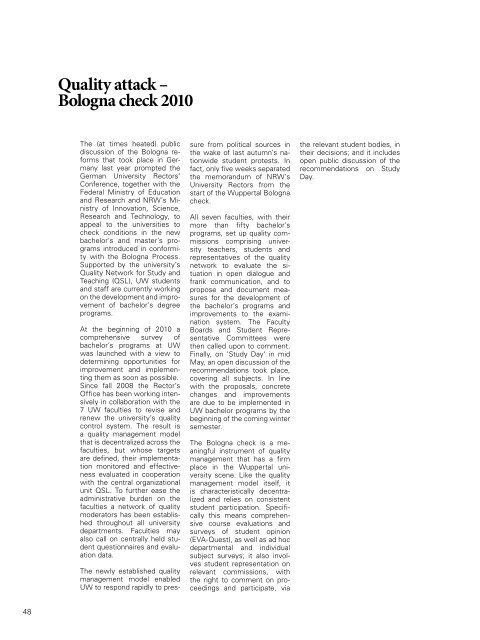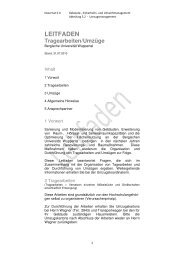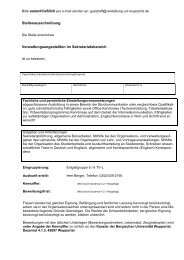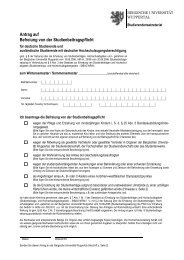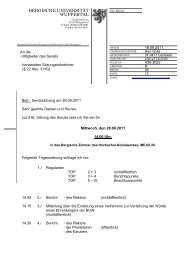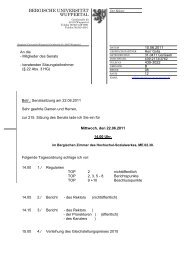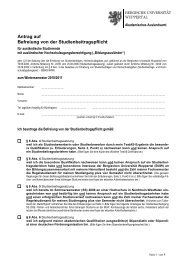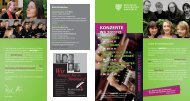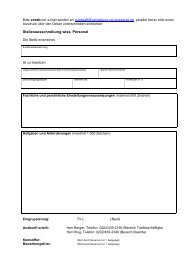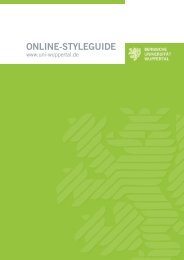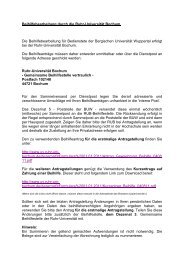School - Bergische Universität Wuppertal
School - Bergische Universität Wuppertal
School - Bergische Universität Wuppertal
You also want an ePaper? Increase the reach of your titles
YUMPU automatically turns print PDFs into web optimized ePapers that Google loves.
48<br />
Quality attack –<br />
Bologna check 2010<br />
The (at times heated) public<br />
discussion of the Bologna reforms<br />
that took place in Germany<br />
last year prompted the<br />
German University Rectors‘<br />
Conference, together with the<br />
Federal Ministry of Education<br />
and Research and NRW’s Ministry<br />
of Innovation, Science,<br />
Research and Technology, to<br />
appeal to the universities to<br />
check conditions in the new<br />
bachelor’s and master’s programs<br />
introduced in conformity<br />
with the Bologna Process.<br />
Supported by the university’s<br />
Quality Network for Study and<br />
Teaching (QSL), UW students<br />
and staff are currently working<br />
on the development and improvement<br />
of bachelor’s degree<br />
programs.<br />
At the beginning of 2010 a<br />
comprehensive survey of<br />
bachelor’s programs at UW<br />
was launched with a view to<br />
determining opportunities for<br />
improvement and implementing<br />
them as soon as possible.<br />
Since fall 2008 the Rector’s<br />
Office has been working intensively<br />
in collaboration with the<br />
7 UW faculties to revise and<br />
renew the university’s quality<br />
control system. The result is<br />
a quality management model<br />
that is decentralized across the<br />
faculties, but whose targets<br />
are defined, their implementation<br />
monitored and effectiveness<br />
evaluated in cooperation<br />
with the central organizational<br />
unit QSL. To further ease the<br />
administrative burden on the<br />
faculties a network of quality<br />
moderators has been established<br />
throughout all university<br />
departments. Faculties may<br />
also call on centrally held student<br />
questionnaires and evaluation<br />
data.<br />
The newly established quality<br />
management model enabled<br />
UW to respond rapidly to pres-<br />
sure from political sources in<br />
the wake of last autumn’s nationwide<br />
student protests. In<br />
fact, only five weeks separated<br />
the memorandum of NRW’s<br />
University Rectors from the<br />
start of the <strong>Wuppertal</strong> Bologna<br />
check.<br />
All seven faculties, with their<br />
more than fifty bachelor’s<br />
programs, set up quality commissions<br />
comprising university<br />
teachers, students and<br />
representatives of the quality<br />
network to evaluate the situation<br />
in open dialogue and<br />
frank communication, and to<br />
propose and document measures<br />
for the development of<br />
the bachelor’s programs and<br />
improvements to the examination<br />
system. The Faculty<br />
Boards and Student Representative<br />
Committees were<br />
then called upon to comment.<br />
Finally, on ‘Study Day‘ in mid<br />
May, an open discussion of the<br />
recommendations took place,<br />
covering all subjects. In line<br />
with the proposals, concrete<br />
changes and improvements<br />
are due to be implemented in<br />
UW bachelor programs by the<br />
beginning of the coming winter<br />
semester.<br />
The Bologna check is a meaningful<br />
instrument of quality<br />
management that has a firm<br />
place in the <strong>Wuppertal</strong> university<br />
scene. Like the quality<br />
management model itself, it<br />
is characteristically decentralized<br />
and relies on consistent<br />
student participation. Specifically<br />
this means comprehensive<br />
course evaluations and<br />
surveys of student opinion<br />
(EVA-Quest), as well as ad hoc<br />
departmental and individual<br />
subject surveys; it also involves<br />
student representation on<br />
relevant commissions, with<br />
the right to comment on proceedings<br />
and participate, via<br />
the relevant student bodies, in<br />
their decisions; and it includes<br />
open public discussion of the<br />
recommendations on Study<br />
Day.


